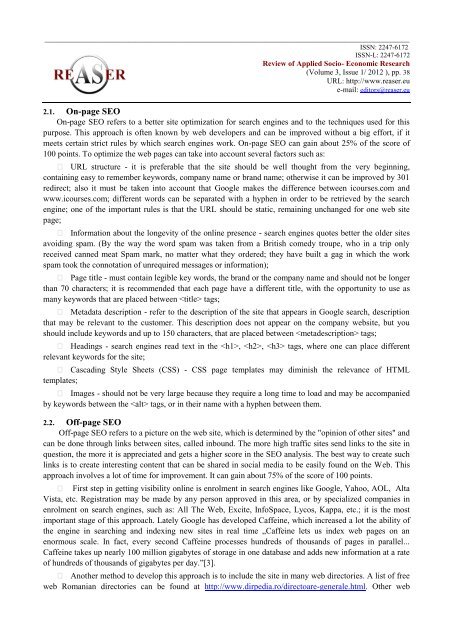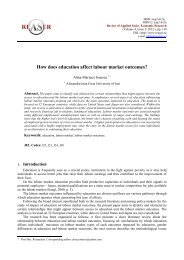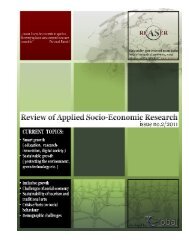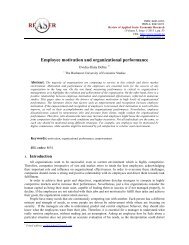Volume 3, ISSUE1/2012 - Review of Applied Socio-Economic ...
Volume 3, ISSUE1/2012 - Review of Applied Socio-Economic ...
Volume 3, ISSUE1/2012 - Review of Applied Socio-Economic ...
You also want an ePaper? Increase the reach of your titles
YUMPU automatically turns print PDFs into web optimized ePapers that Google loves.
________________________________________________________________________________________________<br />
ISSN: 2247-6172<br />
ISSN-L: 2247-6172<br />
<strong>Review</strong> <strong>of</strong> <strong>Applied</strong> <strong>Socio</strong>- <strong>Economic</strong> Research<br />
(<strong>Volume</strong> 3, Issue 1/ <strong>2012</strong> ), pp. 38<br />
URL: http://www.reaser.eu<br />
e-mail: editors@reaser.eu<br />
2.1. On-page SEO<br />
On-page SEO refers to a better site optimization for search engines and to the techniques used for this<br />
purpose. This approach is <strong>of</strong>ten known by web developers and can be improved without a big effort, if it<br />
meets certain strict rules by which search engines work. On-page SEO can gain about 25% <strong>of</strong> the score <strong>of</strong><br />
100 points. To optimize the web pages can take into account several factors such as:<br />
URL structure - it is preferable that the site should be well thought from the very beginning,<br />
containing easy to remember keywords, company name or brand name; otherwise it can be improved by 301<br />
redirect; also it must be taken into account that Google makes the difference between icourses.com and<br />
www.icourses.com; different words can be separated with a hyphen in order to be retrieved by the search<br />
engine; one <strong>of</strong> the important rules is that the URL should be static, remaining unchanged for one web site<br />
page;<br />
Information about the longevity <strong>of</strong> the online presence - search engines quotes better the older sites<br />
avoiding spam. (By the way the word spam was taken from a British comedy troupe, who in a trip only<br />
received canned meat Spam mark, no matter what they ordered; they have built a gag in which the work<br />
spam took the connotation <strong>of</strong> unrequired messages or information);<br />
Page title - must contain legible key words, the brand or the company name and should not be longer<br />
than 70 characters; it is recommended that each page have a different title, with the opportunity to use as<br />
many keywords that are placed between tags;<br />
Metadata description - refer to the description <strong>of</strong> the site that appears in Google search, description<br />
that may be relevant to the customer. This description does not appear on the company website, but you<br />
should include keywords and up to 150 characters, that are placed between tags;<br />
Headings - search engines read text in the , , tags, where one can place different<br />
relevant keywords for the site;<br />
Cascading Style Sheets (CSS) - CSS page templates may diminish the relevance <strong>of</strong> HTML<br />
templates;<br />
Images - should not be very large because they require a long time to load and may be accompanied<br />
by keywords between the tags, or in their name with a hyphen between them.<br />
2.2. Off-page SEO<br />
Off-page SEO refers to a picture on the web site, which is determined by the "opinion <strong>of</strong> other sites" and<br />
can be done through links between sites, called inbound. The more high traffic sites send links to the site in<br />
question, the more it is appreciated and gets a higher score in the SEO analysis. The best way to create such<br />
links is to create interesting content that can be shared in social media to be easily found on the Web. This<br />
approach involves a lot <strong>of</strong> time for improvement. It can gain about 75% <strong>of</strong> the score <strong>of</strong> 100 points.<br />
First step in getting visibility online is enrolment in search engines like Google, Yahoo, AOL, Alta<br />
Vista, etc. Registration may be made by any person approved in this area, or by specialized companies in<br />
enrolment on search engines, such as: All The Web, Excite, InfoSpace, Lycos, Kappa, etc.; it is the most<br />
important stage <strong>of</strong> this approach. Lately Google has developed Caffeine, which increased a lot the ability <strong>of</strong><br />
the engine in searching and indexing new sites in real time „Caffeine lets us index web pages on an<br />
enormous scale. In fact, every second Caffeine processes hundreds <strong>of</strong> thousands <strong>of</strong> pages in parallel...<br />
Caffeine takes up nearly 100 million gigabytes <strong>of</strong> storage in one database and adds new information at a rate<br />
<strong>of</strong> hundreds <strong>of</strong> thousands <strong>of</strong> gigabytes per day.”[3].<br />
Another method to develop this approach is to include the site in many web directories. A list <strong>of</strong> free<br />
web Romanian directories can be found at http://www.dirpedia.ro/directoare-generale.html. Other web








